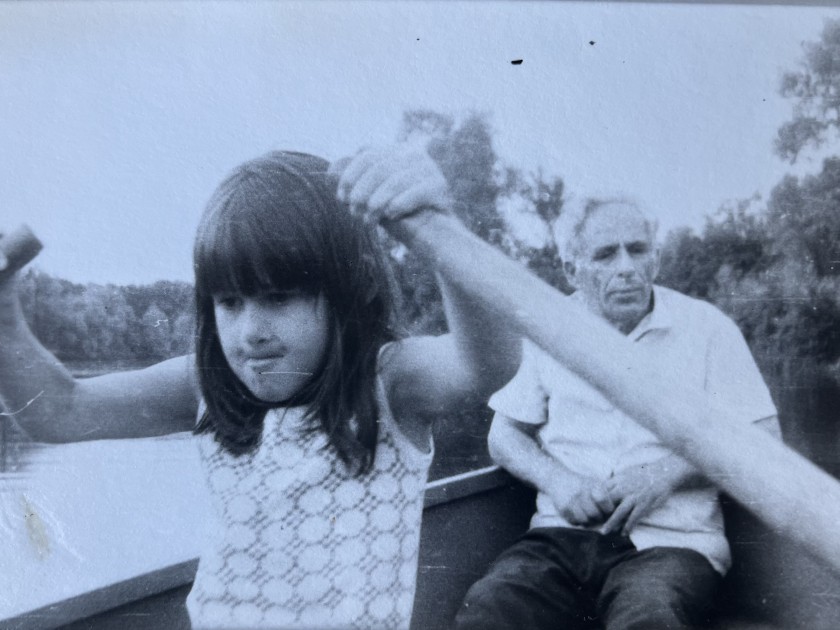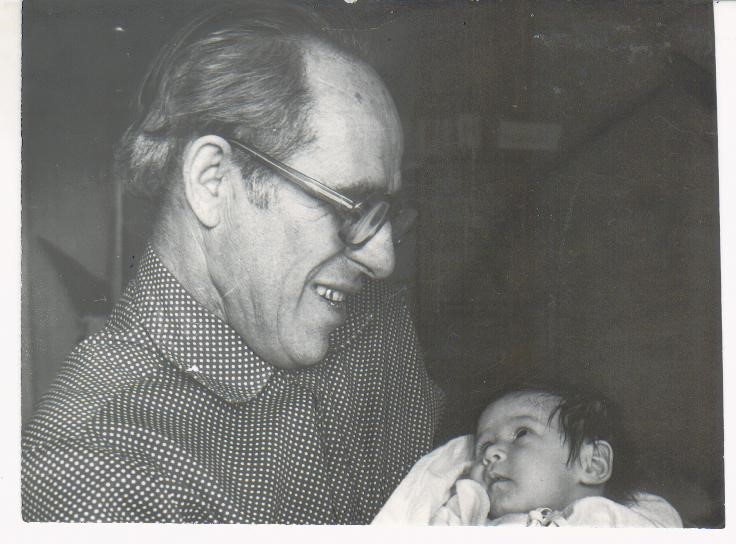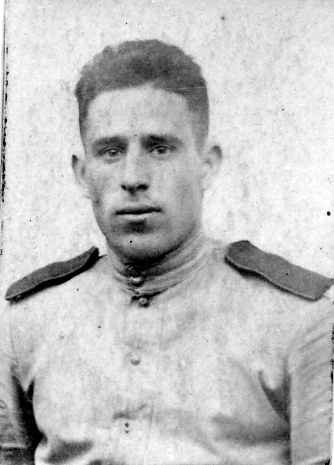
Sasha’s grandfather taught her how to row a boat, but not what it meant to be Jewish.
All photos courtesy of the author
There were two things my favorite grandfather – my dad’s dad and the inspiration for my novel Your Presence is Mandatory–never talked about: being Jewish and the war.
I don’t remember when exactly I learned that my Ukrainian grandpa was actually a member of the tribe. It must have been after the fall of the Soviet Union, when the concept of Jewishness first entered my periphery. Until then, all religion was seen by Communists as opium for the masses and was supposed to be hidden away; I’d never seen him light Hanukkah candles, touch a mezuzah, or eat challah. In fact, I didn’t even know what these things were.
The fall of communism opened the doors for Jewish organizations to set up shop all over Eastern Europe and allowed many Jewish parents and grandparents – who’d been hiding their identity – to tell their children they were different from their Slavic friends.
Yet my grandpa remained silent. Instead, the news about my identity was broken to me by my mother, Jewish herself from my maternal grandmother, when she took me to a Purim party in Moscow. I still remember the electric feeling of entering a room of costumed strangers who belonged to what seemed like a secret society.
In school the next day, I glowed with a sense of being unique among my classmates. Special, even. And yet, I instinctively felt that in Russia my identity wasn’t something to advertise. No one in my school knew I was Jewish because I hadn’t inherited a Jewish last name.
Grandpa, whose patrilineal last name I should have carried, had grown up in a large Jewish family in a Ukrainian village. His parents spoke Yiddish. They probably celebrated Shabbat and maybe even went to synagogue, until the Communist regime changed its views on tolerance and it became safer to blend in with all things Russian. By the time Grandpa, already a World War II veteran, married my Ukrainian grandmother, the country was going through an intense period of antisemitism in the last year of Stalin’s life. So when my grandmother gave birth to my father, he was given her Ukrainian last name for his safety. That’s the name I carry today, the one on the cover of Your Presence is Mandatory. Grandpa’s last name, passed down from generations before him, disappeared.
The thing was – he didn’t seem to mind. Even in the freer post-Soviet years, Grandpa never took me to Purim parties. When Grandma, a non-Jew, got a job at a Jewish organization and began to teach me about Rosh Hashanah, he did not take part. In fact, I never saw him express any form of Jewish identity whatsoever. To me, he was a World War II veteran, a retired geologist, and the best latke-maker on the planet. He was always the one to meet me when I arrived by train to his city in Ukraine, the one who took me fishing, the one who trusted me to row him around on a simple wooden riverboat. And though I ultimately knew he was Jewish, I never really thought of him as such.

Sasha didn’t inherit her grandpa’s Jewish last name because of Soviet antisemitism.
Mainly, what I felt toward him was pride. He had not just fought in World War II, but “made it all the way to Berlin,” which meant he’d fought during the entire war, through the final battle that ended Hitler’s madness. In short, a war hero. The fact that he was a Jew who fought the Nazis was a side note, even if a satisfying one. I had not realized how central Jewishness was to his past until after his death.
Several months after his funeral, my grandmother called me to say she’d found a letter. Apparently, despite burning most of his old documents, my grandfather had left a confession letter addressed to the KGB in which he recounted the incredible lengths he’d gone to in order to survive as a Jew in wartime Germany. The story was nothing like we’d assumed and it turned all that we knew of him upside down. At the time, I was working as a journalist in San Francisco, and to me, his unique wartime survival story seemed just as intriguing as his lifelong secrecy about it. It felt like the stuff of novels.
I began researching Your Presence is Mandatory in Berlin in 2017. Being in the city where Grandpa had celebrated Victory Day seventy years earlier, I wondered which of the totalitarian regimes he lived through – Nazi Germany or the Soviet Union – was responsible for him not wanting to pass on the traditions, language, and beliefs of his parents. Of course, I couldn’t ask him. And given that I was fictionalizing his story, I had to find my own answers about what happens to one’s private identity in the face of public autocracy.
As I worked to turn my grandfather’s dramatic story into a multigenerational epic about secrets, shame, fear, bravery, and love, I couldn’t help but wonder how it would have felt to write this book – and live my life – under his Jewish last name. And, perhaps more importantly, how my own identity would have been different if, while teaching me to fish, my grandfather had passed on the knowledge of his ancestors and the belief that being Jewish was a quintessential part of who I was.

Sasha’s grandfather was a Soviet WWII soldier who never talked about the war.
As someone who carries a Ukrainian last name, an American passport, has Jewish blood (along with a sprinkling of Genghis Khan genes), and uses the Russian language, my identity is akin to a potato salad where Jewishness is only one ingredient– and perhaps not even the potato. I often crave that soulful feeling of belonging that I see between other Jews. But perhaps, telling Grandpa’s story of survival – and with it the untold story of hundreds of thousands of other Soviet Jewish soldiers like him – will be my way of contributing to the community and reclaiming my heritage.
Sasha Vasilyuk was born in the Soviet Crimea and spent her childhood between Ukraine and Russia before immigrating to San Francisco at age 13. She has a MA in Journalism from New York University, and her nonfiction has been published in The New York Times, Harper’s Bazaar, BBC, The Telegraph, Los Angeles Times, and elsewhere. She lives in San Francisco, California with her family.